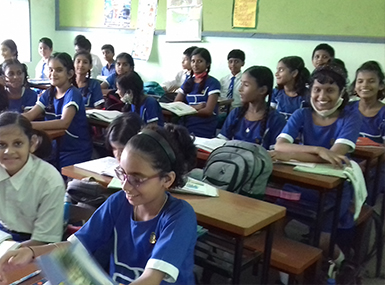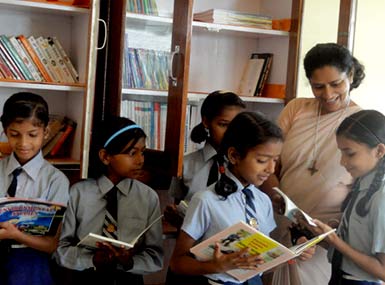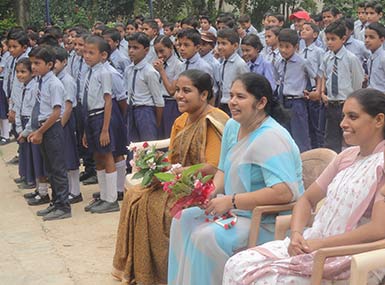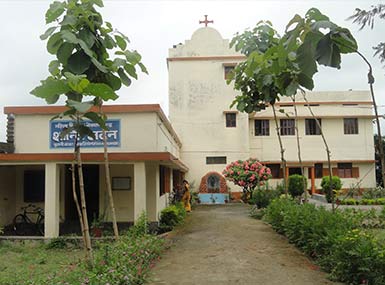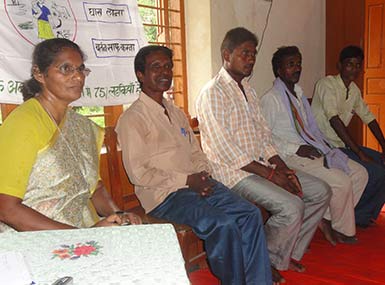|
Shanti Sadan Convent,
Narkatiagunj, Bihar (1986) ‘Option for the poor’ was the slogan of the 1984 RNDM Chapter. All RNDM sisters and communities were asked to make a radical choice for simple life style and move away from institutionalized type of ministry. They were requested to move our hearts and homes into the communities of the poor and the marginalized people of the world. While the European provinces adopted a country from the third world, in India the sisters ventured out to live among the Harijans and the Dailits of Bihar. The invitation of Bishop Thakur SJ from Muzaffarpur diocese, Bihar, was therefore gladly welcomed by the RNDM sisters. No stone was left unturned until the sisters opened a mission. The history of the land mass currently known as Bihar is very ancient. In fact, it extends to the very dawn of human civilization. It is situated in the eastern part of India with the Himalayan Kingdom of Nepal to its north and borders the states of Orissa, West Bengal, Uttar Pradesh and Madhya Pradesh. The name is derived from “Vihara” – a land of monasteries. Hindu, Buddhist, Jain, Muslim, and Sikh shrines abound in this ancient land. Earliest myths and legends of Hinduism are associated with Bihar. It is also a land of great religions like Jainism and Buddhism. Prince Gautama Buddha attained supreme knowledge to become Buddha, the enlightened one here in this land. It is today home to more than 80 million Indians and endowed with an enviable mineral resource base with some of India’s finest industries. However, this rich state in terms of natural and human resources, and the second most populous in the country has been slow to harness its natural and human resources for the development of the state and its people. It was to West Champaran district of Bihar, that the RNDM sisters heard the call to make their home among the poor. This district borders Nepal and has a literacy rate of 39.63%. Social evils like child marriage, dowry system, girl infanticide, caste system, bondage and superstitions have been prevalent in the region for generations. The poverty in Bihar is acute and the status of women is very pitiable. To open a community among the less fortunate brothers and sisters was readily welcomed by all the members of the Provincial Chapter. Some of the sisters were truly imbued by the zeal of Eupharise and volunteered to opt for this unique mission. The invitation of Rt. Rev John Baptist Thakur SJ, the Bishop of Muzaffarfur was seen as an answer to the need. In 1985 Mother Mary John Bosco, Shadap, Provincial, Sr. Mary Sebastian Thekkekara and Sr. Helen Shah visited, and the Bishop was delighted with the arrival of the missionaries. They toured around possible places and even made their temporary abode among the people to find an appropriate place to lay this new foundation. Sr. Mary Bernadine Mullaveetil, was appointed as the provincial at this time and her team visited the region, finally selecting Narkatiagnaj as the location for this new endeavor. Therefore on 10th February 1986, the foundation of the RNDM Bihar mission came into existence. An old church building was renovated to become the residence of the sisters. Srs. Marie Vengathanam, Helen Shah and Jyothi Joseph were sent to this most challenging mission of the province. The sisters began to work in collaboration with the diocese and it’s polices. Narkatiaganj is a subdivision of West Champaran, a district of North Bihar with a population of 40,830. Males constitute 54% of the population and females 46%. Narkatiaganj has an average literacy rate of 59%, lower than the national average of 59.5%: male literacy is 68%, and female literacy is 32%. In Narkatiaganj, 17% of the population is under 6 years of age and 99 % of the people are Hindus. There is very low Catholic presence, and very little awareness of Christianity or Catholic religious life. The sisters lived more like social workers and friends to the people. The local communities were delighted by the presence and service of the sisters but the RNDMs were received as mysterious beings by the people. The local community wondered about the Sisters independence, their education, their courage to stay without men. Abundant questions and doubts were asked about the sisters’ celibacy. The sisters continued to serve the community and adapted a very simple life style, like that of the people. The aim of the Bihar mission was to participate in the religious, educational, health and social ministries and to help in the elementary education of the poor particularly of the women, though ‘non-formal’ and informal education and service. Education of the women was the priority but an institutionalized approach was not taken. The sisters imparted non-formal education under the trees and open spaces in the villages .They chose songs, stories, dramas, posters to educate and conscientious the villagers, focusing particular attention to women and children. After many years of hard work the sisters have gradually managed to win the hearts and minds of the people to remedy some of the social problems that suppressed their growth and bring them to main stream of life. Today the mission is harvesting goodness following the difficult days of the pioneers as we witness how the women of this district of Bihar have grown to be independent, ready to challenge the employers for just wages, demanding respectful treatment from their husbands and developing an eagerness to send their children to school. Currently while carrying out the non-formal educations centers in the villages, the sisters have opened a Hindi medium school to provide quality education. They continue with activities for the empowerment of the women who have not had class room education.
Joy of learning
Quality education
Sr. Jaya enjoys a moment at school sports
The convent and social work centre
Awareness programme
|
|
|
